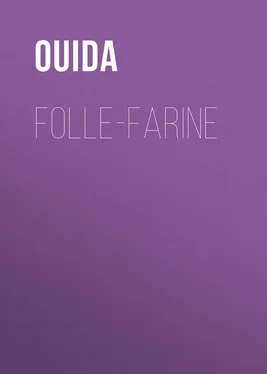Ouida - Folle-Farine
Здесь есть возможность читать онлайн «Ouida - Folle-Farine» — ознакомительный отрывок электронной книги совершенно бесплатно, а после прочтения отрывка купить полную версию. В некоторых случаях можно слушать аудио, скачать через торрент в формате fb2 и присутствует краткое содержание. Жанр: foreign_prose, literature_19, foreign_antique, на английском языке. Описание произведения, (предисловие) а так же отзывы посетителей доступны на портале библиотеки ЛибКат.
- Название:Folle-Farine
- Автор:
- Жанр:
- Год:неизвестен
- ISBN:нет данных
- Рейтинг книги:5 / 5. Голосов: 1
-
Избранное:Добавить в избранное
- Отзывы:
-
Ваша оценка:
- 100
- 1
- 2
- 3
- 4
- 5
Folle-Farine: краткое содержание, описание и аннотация
Предлагаем к чтению аннотацию, описание, краткое содержание или предисловие (зависит от того, что написал сам автор книги «Folle-Farine»). Если вы не нашли необходимую информацию о книге — напишите в комментариях, мы постараемся отыскать её.
Folle-Farine — читать онлайн ознакомительный отрывок
Ниже представлен текст книги, разбитый по страницам. Система сохранения места последней прочитанной страницы, позволяет с удобством читать онлайн бесплатно книгу «Folle-Farine», без необходимости каждый раз заново искать на чём Вы остановились. Поставьте закладку, и сможете в любой момент перейти на страницу, на которой закончили чтение.
Интервал:
Закладка:
He took some leaves of a simple herb that he knew, soaked them with water, and bound them on her shoulders, not ungainly, though his hand was so rough with labor, and, as men said, had been so often red with carnage. Then he gave her a draught of goat's milk, sweet and fresh, from a wooden bowl; shared with her the dry black crusts that formed his only evening meal; bestowed on her a gift of a rare old scarlet scarf of woven wools and Eastern broideries, one of the few relics of his buried life; lifted the fagots on her back, so that she could carry them with greater ease; and set her on her homeward way.
"Come to me again," he said, briefly, as she went across the threshold. The child bent her head in silence, and kissed his hand quickly and timidly, like a grateful dog that is amazed to have a caress, and not a blow.
"After a forty years' vow I have broken it; I have pitied a human thing," the old man muttered as he stood in his doorway looking after her shadow as it passed small and dark across the scarlet light of the poppies.
"They call him vile, and they say that he slew men," thought the child, who had long known his face, though he never had noted hers; and it seemed to her that all mercy lay in her father's kingdom—which they called the kingdom of evil. The cool moist herbs soaked on her bruises; and the draught of milk had slaked the thirst of her throat.
"Is evil good?" she asked in her heart as she went through the tall red poppies.
And from that evening thenceforward Folle-Farine and Marcellin cleaved to one another, being outcasts from all others.
CHAPTER III
As the religious gathering broke up and split in divers streams to wander divers ways, the little town returned to its accustomed stillness—a stillness that seemed to have in it the calm of a thousand sleeping years, and the legends and the dreams of half a score of old dead centuries.
On market-days and saint-days, days of high feast or of perpetual chaffering, the town was full of color, movement, noise, and population. The country people crowded in, filling it with the jingling of mule-bells; the fisher people came, bringing in with them the crisp salt smell of the sea and the blue of the sea on their garments; its own tanners and ivory carvers, and fruiterers, and lacemakers turned out by the hundred in all the quaint variety of costumes that their forefathers had bequeathed to them, and to which they were still wise enough to adhere.
But at other times, when the fishers were in their hamlets, and the peasantry on their lands and in their orchards, and the townsfolk at their labors in the old rich renaissance mansions which they had turned into tanneries, and granaries, and wool-sheds, and workshops, the place was profoundly still; scarcely a child at play in the streets, scarcely a dog asleep in the sun.
When the crowds had gone, the priests laid aside their vestments, and donned the black serge of their daily habit, and went to their daily avocations in their humble dwellings. The crosses and the censers were put back upon their altars, and hung up upon their pillars. The boy choristers and the little children put their white linen and their scarlet robes back in cupboards and presses, with heads of lavender and sprigs of rosemary to keep the moth and the devil away, and went to their fields, to their homes, to their herds, to their paper kites, to their daisy chains, to the poor rabbits they pent in a hutch, to the poor flies they killed in the sun.
The streets became quite still, the market-place quite empty; the drowsy silence of a burning, cloudless afternoon was over all the quiet places about the cathedral walls, where of old the bishops and the canons dwelt; gray shady courts; dim open cloisters; houses covered with oaken carvings, and shadowed with the spreading branches of chestnuts and of lime-trees that were as aged as themselves.
Under the shelter of one of the lindens, after the populace had gone, there was seated on a broad stone bench the girl who had stood by the wayside erect and unbending as the procession had moved before her.
She had flung herself down in dreamy restfulness. She had delivered her burden of vegetables and fruit at a shop near by, whose awning stretched out into the street like a toadstool yellow with the sun.
The heat was intense; she had been on foot all day; she sat to rest a moment, and put her burning hands under a little rill of water that spouted into a basin in a niche in the wall—an ancient well, with a stone image sculptured above, and a wreath of vine-leaves in stone running around, in the lavish ornamentation of an age when men loved loveliness for its own sake, and begrudged neither time nor labor in its service.
She leaned over the fountain, kept cool by the roofing of the thick green leaves; there was a metal cup attached to the basin by a chain, she filled it at the running thread of water, and stooped her lips to it again and again thirstily.
The day was sultry; the ways were long and white with powdered limestone; her throat was still parched with the dust raised by the many feet of the multitude; and although she had borne in the great basket which now stood empty at her side, cherries, peaches, mulberries, melons, full of juice and lusciousness, this daughter of the devil had not taken even one to freshen her dry mouth.
Folle-Farine stooped to the water, and played with it, and drank it, and steeped her lips and her arms in it; lying there on the stone bench, with her bare feet curled one in another, and her slender round limbs full of the voluptuous repose of a resting panther.
The coolness, the murmur, the clearness, the peace, the soft flowing movement of water, possess an ineffable charm for natures that are passion-tossed, feverish, and full of storm.
There was a dreamy peace about the place, too, which had charms likewise for her, in the dusky arch of the long cloisters, in the lichen-grown walls, in the broad pamments of the paven court, in the clusters of delicate carvings beneath and below; in the sculptured frieze where little nests that the birds had made in the spring still rested; in the dense brooding thickness of the boughs that brought the sweetness and the shadows of the woods into the heart of the peopled town.
She stayed there, loath to move; loath to return where a jeer, a bruise, a lifted stick, a muttered curse, were all her greeting and her guerdon.
As she lay thus, one of the doors in the old houses in the cloisters opened; the head of an old woman was thrust out, crowned with the high, fan-shaped comb, and the towering white linen cap that are the female note of that especial town.
The woman was the mother of the sacristan, and she, looking out, shrieked shrilly to her son,—
"Georges, Georges! come hither. The devil's daughter is drinking the blest water!"
The sacristan was hoeing among his cabbages in the little garden behind his house, surrounded with clipt yew, and damp from the deep shade of the cathedral, that overshadowed it.
He ran out at his mother's call, hoe in hand, himself an old man, though stout and strong.
The well in the wall was his especial charge and pride; immeasurable sanctity attached to it.
According to tradition, the water had spouted from the stone itself, at the touch of a branch of blossoming pear, held in the hand of St. Jerome, who had returned to earth in the middle of the fourteenth century, and dwelt for awhile near the cathedral, working at the honorable trade of a cordwainer, and accomplishing mighty miracles throughout the district.
It was said that some of his miraculous power still remained in the fountain, and that even yet, those who drank on St. Jerome's day in full faith and with believing hearts, were, oftentimes, cleansed of sin, and purified of bodily disease. Wherefore on that day, throngs of peasantry flocked in from all sides, and crowded round it, and drank; to the benefit of the sacristan in charge, if not to that of their souls and bodies.
Читать дальшеИнтервал:
Закладка:
Похожие книги на «Folle-Farine»
Представляем Вашему вниманию похожие книги на «Folle-Farine» списком для выбора. Мы отобрали схожую по названию и смыслу литературу в надежде предоставить читателям больше вариантов отыскать новые, интересные, ещё непрочитанные произведения.
Обсуждение, отзывы о книге «Folle-Farine» и просто собственные мнения читателей. Оставьте ваши комментарии, напишите, что Вы думаете о произведении, его смысле или главных героях. Укажите что конкретно понравилось, а что нет, и почему Вы так считаете.











